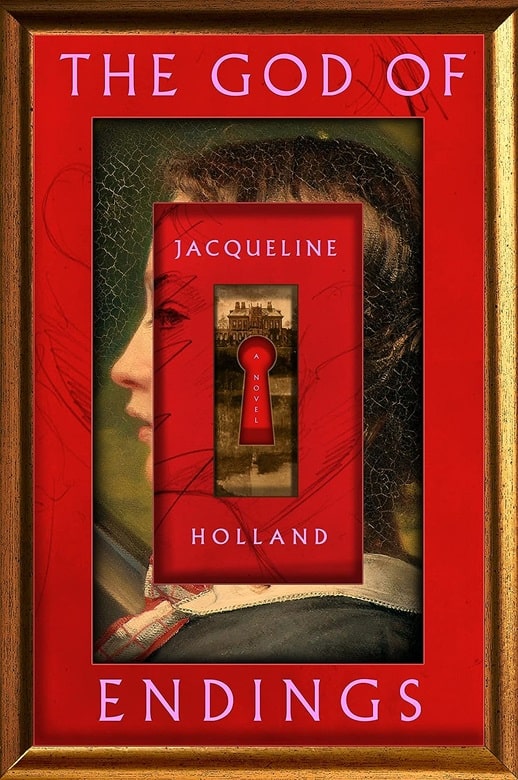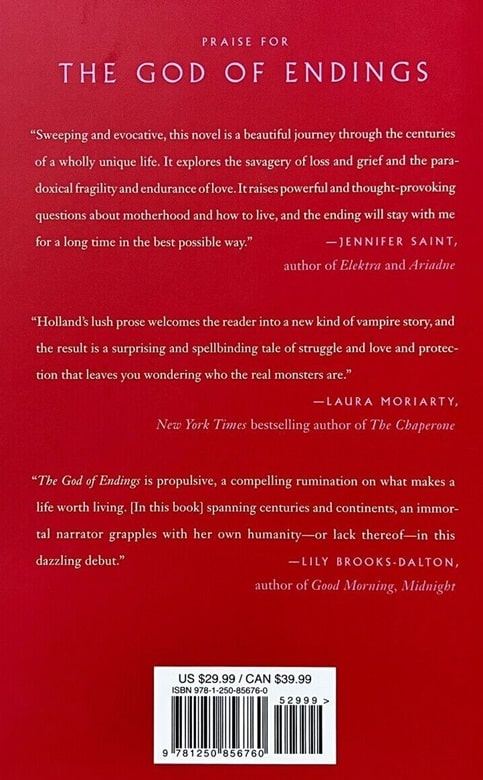A Really Impressive First Novel: The God of Endings by Jacqueline Holland
 |
 |
The God of Endings (Flatiron Books, March 7, 2023)
At this year’s Capricon I shared an autograph session with Jacqueline Holland. In the way of things, especially with customers sparse, I ended up signing a couple of my books for her and she signed a copy of her first novel, The God of Endings, for me. The novel was published in March 2023 by Flatiron Books, a fairly new imprint.
Jacqueline Holland got her MFA from the University of Kansas, studying with the wonderful Kij Johnson. She has published work in some impressive literary journals, like Big Fiction. This novel is fantasy, and she told me her next two novels will be science fiction. It’s a vampire novel, which is normally not my thing, but Jacqueline’s description made it sound intriguing, and not your standard vampire novel (certainly these are not sparkly vampires!) and it lived up to that.
It’s told by Collette Le Sange (a significant name, obviously.) She tells it in two threads. One goes back to her birth, in upstate New York around 1830. Her birth name is Anna, and her father is a stonecutter who makes gravestones. But sickness comes to her village, and when people start dying there is talk of witches. Her family is suspected, but they fall ill too, and eventually a man she does not know, her grandmother’s second husband, comes to take her away. She dies, though, and is buried. But her grandfather has done something, and soon she is born again, a vampire. Before long she is sent across the ocean to Europe, to live with her grandfather’s ancestral family.
On the ship there begins a repeated sequence: she befriends a sickly young girl, and kills a menacing rapist (drinking his blood, of course), only to have to abandon the girl in England. In Eastern Europe she is happy for a while with a found family: the motherly Piroska and the strange twins Vano and Ehru, one of whom is another vampire. But rumors of witchery come again, and Anya (as she is now called) escapes and is eventually rescued by a kindly artist, who comes to love her (despite her strangeness) and who teaches her to draw and paint.
But this too must end, and we go forward again, eventually to France as the Second World War begins, and she befriends a young woman and helps teach some Jewish refugee students only to be chased out again, then on to Alexandria, and another terrible loss. And finally she comes back to upstate New York, to her grandfather’s old house, and opens a private school, teaching young children again.
And the other thread is set in 1984, and Anna, now Collette, is teaching at her school. One young boy, Leo, shows remarkable artistic talent, but he is shy and clearly there are problems at home. His parents’ marriage is obviously in trouble, and against her will Collette agrees to help care for Leo while the parents, Dave and Katherine, work out their issues. Collette becomes close to Katherine, while noticing various danger signs. Meanwhile, Leo, though developing as an artist, seems to be getting sick.
And Collette herself is having difficulties — her thirst for blood, usually easily sated with an occasional sip from her cats, is getting worse and worse and she finds herself waking up with terrible scratches and evidence that she has been sleepwalking in the woods. Her dreams recall her past, with visions of Vano and Ehru. Dave and Katherine’s marriage is coming to a crisis, with unpleasant revelations and nothing but tragedy for Leo, who is also sicker and sicker.
The resolution turns on several crises: an explosive event involving Leo’s parents, an unexpected visit from someone from Collette’s past, Collette herself realizing what she has been doing in the night, Leo’s health turning for the worse. The conclusion is something I had expected for a while, but is still effectively sprung, and is very dark and oddly hopeful, indeed almost cathartic.
This is a really impressive first novel, very well written, very moving. It powerfully portrays the serial losses that Anna/Anya/Collette experiences — each one wrenching, as the reader hopes for happiness for Collette and her friendships only to see time, superstition, prejudice and war always intervene. It slackens a bit towards the middle, but not fatally, and it remains involving, and as I said the ending is very affecting. Highly recommended.
Rich Horton’s last article for us was an obituary for Brian Stableford. His website is Strange at Ecbatan. Rich has written over 200 articles for Black Gate, see them all here.
I hope she does well. If Holland’s work is as good as you review here, it may dispel some of the efficacy of the old adage: “MFA programs are a waste of time for REAL writers.”
I have plenty of reservations about MFA programs, but I do think specific instructors can make a difference, and I have tremendous respect for Kij Johnson!
I will definitely check this novel out, Rich. Thanks!